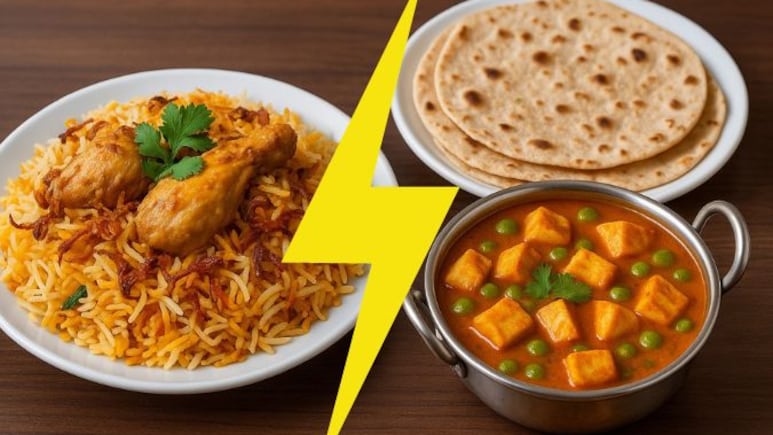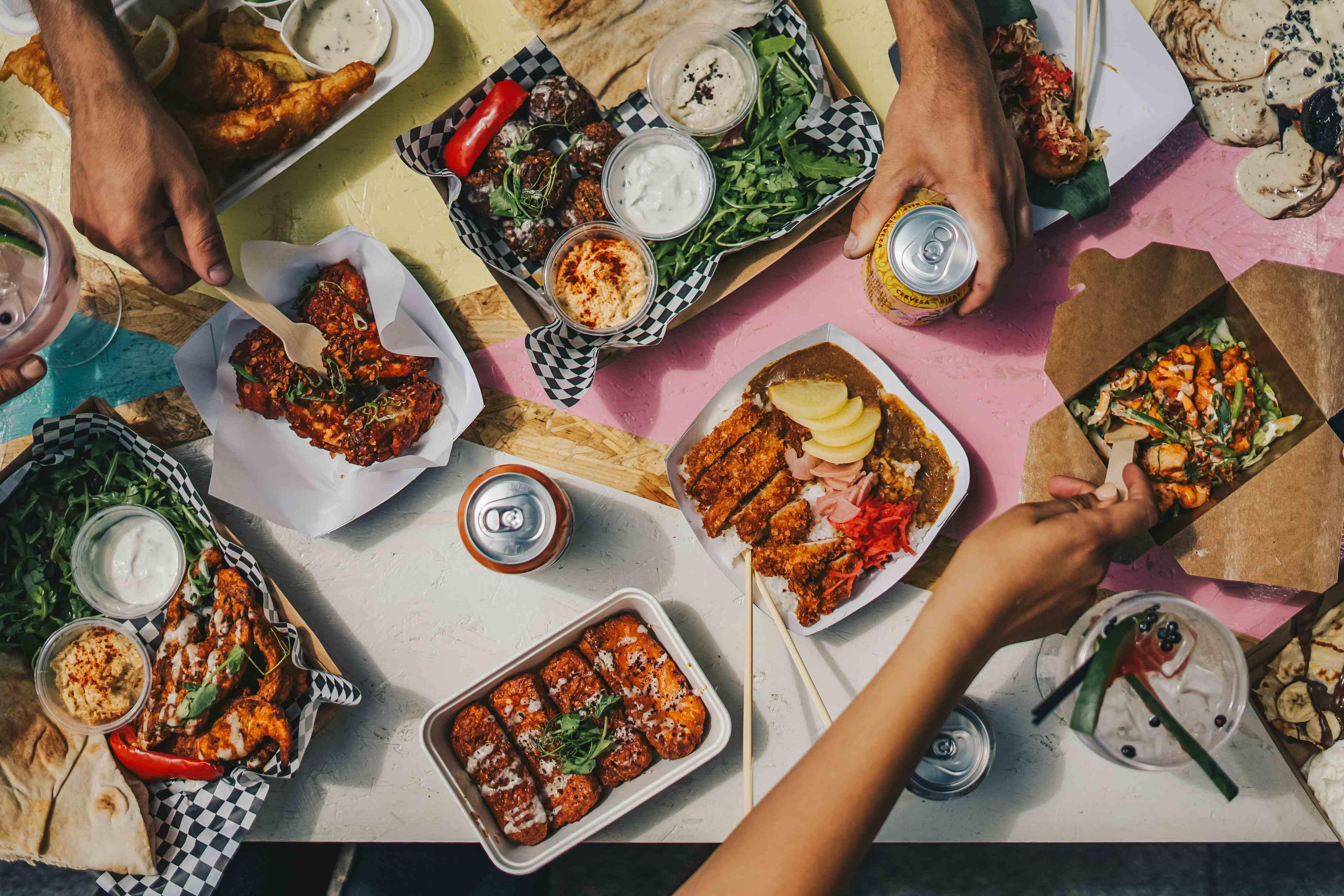
For Indian singles today, love isn't just in the air - it's on the plate. Food has long been a love language, but in a country like India where culinary traditions are deeply personal and fiercely protected, it's often so much more.
A plate of food here isn't just a mix of green leafy vegetables and bread. It's a full-blown love affair - a symphony of spices, emotions and stories passed down generations. What makes that plate even more special? It's who you're sharing it with - or not sharing, if you're like Joey from Friends who doesn't share food. For some, it's about ordering two separate dishes and eating together in silence. For others, it's feeding each other bites of the same meal while arguing about which chutney is superior.

Culinary compatibility is in focus in India. Photo: Unsplash
But what happens when two people from different food worlds start dating? Can a vegetarian fall in love with a meat-lover? Will ordering paneer instead of pork cause friction? Can something as seemingly simple as a thali vs a tandoori platter be a deal breaker?
We spoke to people across the country, and it turns out, food can both make and break love.
'We Broke Up Because Of This'
Some relationships crumble not because of big fights or cheating scandals, but because of incompatible food preferences.
Rishabh Agarwal*, 25, a working professional from Delhi, shared how his relationship ended over dietary differences.
"We started out knowing we had different food habits - she was vegetarian, I was not - but we didn't think much of it. Over time though, eating out, ordering in, even deciding where to go became exhausting. It felt like we were constantly adjusting. Eventually, we just gave up," he says.
Sanjini*, 24, from Chennai, echoes a similar experience.
"I was dating a guy from a Jain background. I grew up in a Tamil household eating all kinds of meat - from prawns to mutton. But with him, there was always this underlying tension. I was constantly aware of this difference. He was allergic to eggs and hated the smell of seafood. I knew deep down that this wasn't going to work long-term."
'When Love Trumps Food'
Not all stories end in heartbreak, though. For some, love wins, and food just adapts.
Rohit Kumar*, a 25-year-old MTech student from Assam, gave up meat completely when he started dating a vegetarian classmate.
"It wasn't a big deal. She mattered more. I knew she would be the one compromising, so I decided to do it instead," he says.
For Komal Lath, a working professional from Delhi and her husband, who come from very different food preferences, things have always been smooth. "We both love food, and we're adventurous. I'm vegetarian, he's not. When we travel, we mark out little hole-in-the-wall joints. I enjoy watching him explore non-veg dishes. Once, in Kazakhstan, he ate horse meat and I just stuck to a salad."

For some, sharing food is a love language. Photo: Unsplash
Komal admits the only challenge is when they travel as a pair and can't order many dishes to share.
"That's the only drawback. The variety is reduced for me. But it doesn't affect us emotionally. The respect we have for each other's choices makes up for it," she says.
What Data Says
A recent survey by dating app happn confirms that food is far more than just a background detail in modern romance - it's central to it.
Here's what the survey found:
- 72% of Indian singles believe cooking together strengthens their bond.
- 37% feel immersive food experiences (like workshops or chef's tables) spark deeper conversations early on.
- 52% said they'd love to attend curated culinary events as a way to connect more meaningfully.
When asked about food preferences in relationships:
- 49% said food compatibility was important.
- 29% called it extremely important.
- 43.3% said mismatched tastes were fine depending on the level of difference.
- 25% said incompatible food habits were a complete deal-breaker.
Interestingly, 17% admitted they had crushed on someone based on their food photos or reviews, while another 35% said they might - hinting at the subtle power of a well-curated foodie feed.
Karima Ben Abdelmalek, CEO and President of happn, says, "Food has always been a language of love, but now it's becoming a meaningful way for people to connect and build compatibility. From dining out to experimenting in the kitchen, Indian singles are discovering new ways to bond through flavour, experience, and playfulness."
'It's Not About The Food'
Dr Sachin Mehla, a Gurgaon-based couples therapist trained in Emotionally Focused Therapy and the Gottman Method, says food fights are rarely just about food.
"When a vegetarian and non-vegetarian are struggling, it's rarely because of the dish on the table. It's about how accepted, respected, or judged someone feels. If meals become a challenge, it often points to deeper emotional disconnect. People thrive in relationships where differences are navigated with curiosity rather than control," he explains.
He adds, "Think about it. Couples with different hobbies, political opinions or religious beliefs make it work. Why not food? It's never about aligning palates - it's about emotional safety."
Dr Mehla shares the story of one couple where food was masking bigger issues.
"When they met, both ate meat. A few years in, she turned vegetarian for ethical reasons. Suddenly, meals became battlegrounds. But the problem wasn't meat or no-meat - it was that she felt her values were dismissed, and he felt judged. Once they felt emotionally safe again, those fights disappeared," he recalls.
His advice for navigating food-based differences?
- Have open conversations about why you eat the way you do.
- Respect your partner's food identity, especially if it's tied to faith or ethics.
- Use practical boundaries: separate utensils, kitchen areas, and clean-up routines.
- Focus on shared experiences: find dishes you both enjoy, or cook together.
"When the emotional bond is strong, food differences don't divide - they deepen the connection," he adds.
Respect, Not Recipes, Builds Love
Sidhharrth S Kumaar, relationship coach at astrology-prediction app NumroVani, agrees that culinary differences aren't usually a deal-breaker - unless there's a lack of mutual respect.
"In my experience, veg-non-veg couples work just as smoothly as any other - if there's respect. It's not about eating the same things. It's about not judging each other's choices."
He adds that problems usually start when one partner tries to 'convert' the other or makes comments about their food.
"Judgement destroys intimacy. I saw a man constantly mocking his girlfriend's meat-eating habits. She felt emotionally distant, and eventually left - not because of meat, but because of the superiority complex," Kumaar says.
Interestingly, Sidhharrth points out that it's not just veg vs non-veg where conflict brews.

For Indian singles today, love isn't just in the air - it's on the plate. Photo: Unsplash
"Even within vegetarian or non-vegetarian preferences - like someone who won't eat garlic, or someone who eats beef - there can be friction," he says.
Reflecting on the last few years, he says about 20-22% of couples he's worked with have faced issues due to dietary differences. But the successful ones?
"They're the ones who don't try to 'fix' each other, and instead, enjoy discovering the other's food world."
So, Can Biryani Lead To A Breakup?
It depends. For some, love means learning to enjoy mushroom pulao when you'd rather have chicken tikka. For others, it's being able to eat your pork ribs while your partner enjoys their dal chawal - no questions asked.
At the heart of it, food preferences aren't just about taste. They're about comfort, culture, identity, and emotion. When respected, they become shared rituals. When ignored, they can cause problems.
(*names changed as per request)
Track Latest News Live on NDTV.com and get news updates from India and around the world

